Draft version 1.7
"Daddy, why do cars and buildings ALWAYS have the right to wear cameras, but people sometimes don't?"
-- Stephanie, Age 7, in response to her father being physically assaulted at a McDonalds in Paris, France for wearing a computerized seeing aid.
This half-truth embodies a lack of integrity, most apparent when surveillance is widely used, but personal seeing and memory aids are prohibited. We humans are not good at half-truths. Stories have beginning, middle, and end. Every truth exists within a certain context. When we don't have the full story, things don't make sense. Therefore surveillance is unsatisfying. In this day and age, wearable cameras easy to hide. So it is pointless to try and stop people from secretly recording. Policies against wearing cameras are doomed to fail but only burden those who need camera systems to see and understand their world. I live in the future. I'm facing these issues daily. Soon you will too.
Join me in supporting this declaration of your future rights. We should demand the right for the whole truth.
2. A seeing aid can include a networked wearable computer, for sensemaking, in support of understanding sensory data in realtime.
3(a). Right to secretly record while under duress or potential threat.
3(b). Inalienable right to record while being detained.
3(c). Right to record if going to be held accountable for one's actions.
4. Right to share you own life experiences. ... to tell your life story, for health monitoring and personal safety, to provide an alibi, etc..
Ordinality: Persons should have more right to see than things. Protection of human life should be allowed where things protected.
Equiveillance: Right to record while being recorded.
Surveillance is a half-truth, if sousveillance is prohibited.
Veillance Contract: Inadmissability of tampered (one-sided) evidence:
All parties may record until a non-recording contract comes into effect:
Party A agrees not to use their recordings against B.
Party B agrees to cease recording.
receipt analogy.
Making it real. We're engineers, scientists, and inventors. We want to create a better future, through our technologies like Videscrow, NotRecord, AlibEye, and dTaz.
Embedded journalists with military or police, for example, can't be objective as there is an inherent conflict-of-interest, rendering them subject to merely conveying government propaganda. In this sense they become police or military shills, i.e. bedfellows ("embedfellows") with the organizations they're reporting on.
True journalists with integrity often come under attack, threatened with violence for being honest.
To the extent that we're all journalists in the "Web 3.0" (cyborgspace) era of the Internet, the very act of remembering and reporting what we see sometimes get us into trouble. See for example "Boston Police Commissioner Hoping to Criminalize the Recording of Cops in Public". ... "Cop Draws Gun On Resident For Filming Police From His Own Driveway".
Cameras are borne by cars (with "dashcams"), buildings, light posts, and many other objects. In some sense these inanimate objects have been given the gift of sight.
Acting with integrity means remembering what you did, so you can live your life by certain principles. Criminalizing sight and remembrance is therefore a direct blow to integrity.
Who do you call when you see a police officer breaking the law, or a corrupt oversight official committing murder? Every government and major corporation employs professional security services and extensive surveillance. But who is watching them?
Personal narrative:
Back in the early 1990s when I was a student at MIT, the first thing I wanted
to do when I got there was swim in the Charles River, but I was warned the
water was dangerous due to pollution from Polaroid Corporation's
chemical plant located upstream from MIT.
Since I couldn't swim in the river, the next thing I tried doing was some
photography about 1.7 miles upstream from MIT of the Polaroid building,
an hisorical art deco landmark.
I was physically assaulted by Polaroid's security guards merely for trying
to photograph the building. They seemed to have a lot of surveillance
cameras mounted to their building, perhaps to make sure that nobody takes
pictures of it. The guards seemed to think that they owned not
only their building, but the surrounding public property, claiming that I was
not allowed to photograph their building, even if I was on public
property.
On my first day of class at MIT, one of my
professors (who also worked in Polaroid Corporation's vision research
laboratory) walked around the class, shooting a closeup
picture of each of the students in his class, without any advance warning. I
recall covering my face with one of my books, kind of half disturbed and half
laughing at the hypocrisy of it all. This experience led me to later
formulate the concept
of Humanistic Property,
i.e. that if we're not allowed to photocopy textbooks or take pictures of
art works (like the Polaroid Art Deco building),
why should others be allowed to photograph us.
--S. Mann
For more than 40 years (since my childhood in the 1970s) I've been inventing,
designing, and building wearable augmented reality camera systems to help me
see and understand the world around me. But I find myself under attack
for merely wearing a camera or trying to see and comprehend the world.
I'm not an activist but I've unwittingly (and in some sense unwillingly)
bumped into the soft underbelly of a rapidly growing monster in our midst.
Polaroid was a big supporter of ID cards and surveillance, watching everyone and helping other large organizations watch everyone. But hardly anyone was watching them. This hypocrisy is nothing new, but now it has grown to a scale that affects everyone in their day-to-day lives.
While governments and large corporations want to know everything about us, they reveal very little about themselves. Their workings are often shrouded in secrecy. Ordinary people are placed under ever-increasing surveillance. At the same time, those who are conducting the surveillance -- and are polluting our air and water supplies, and otherwise placing us in danger -- use threats, intimidation, bribery, and surveillance itself, to avoid scrutiny and to scrutinize those who scrutinize them. In this way, surveillance allows parties in power to keep any opposition in check.
Edward Snowden revealed that governments in the Anglosphere are placing their own citizens under surveillance, watching nearly everything we do. And secret evidence is increasingly used in a range of legal proceedings in USA, UK, and Canada, meaning that cases are being decided on the basis of "evidence" that lacks the benefit of counsel to challenge or question that evidence.
This hypocrisy -- watching you while prohibiting you from watching them -- threatens our physical safety, socio-economic stability, the integrity of health care, and the very foundations of a fair, just, and stable society.
The surveillance industry embraces and embodies this kind of hypocrisy: watching us while remaining hidden from being watched.
Many establishments that record us prohibit us from recording them:
The opposite of hypocrisy is integrity. Surveillance, without integrity, only creates temporary stability and temporary security from low-level street crime. Such surveillance does not protect against larger crimes and corruption, and may, in fact actually be the cause of it [see "Ladder Theory" on page 2 of this paper, or at Singularity Summit 2010].
Those in positions of power or authority over us -- politicians, police, priests, etc., -- are often people very much like us -- most are good, but a few of them are "bad apples". How do you protect yourself from a few bad apples? Police, for example, are more likely to be on the side of other police and security professionals, in any dispute that may arise.
Sensors such as surveillance cameras are all around us, to protect merchandise, buildings, and other property. The surveillance is contstant, and never has to ask our permission. One way we can protect ourselves is to put sensors on our own bodies to monitor our own health, wellness, and the surrounding environment.
Luis Kun writes:
"individual with an electronic health record ... throughout the individual's lifetime. This individual's life may be saved a few times by having the right information in the right place at the right time. The quality of life may improve... The knowledge stored could also provide information related to environmental factors (e.g., quality of the water and air), as well as short- and long-term effects of diet, exercise, ... improve the quality of our healthcare and public health systems while significantly reducing expenses." ["interoperability: the cure for what ails us", Luis Kun, IEEE ENGINEERING IN MEDICINE AND BIOLOGY]
Those who require us to ask permission before recoring our own bodies (including our senses) have placed us in danger and raised health care costs for our society.
If we have to ask permission to put sensors on our own bodies, the result will be an inability to protect ourselves from danger, health risks, and even our own failing eyesight (as can be done with a computerized seeing aid), as well as from others (e.g. as might be needed to defend ourselves in a court of law or prove our own story of what happened).
To bring balance, fairness, and stability to society, I propose the "Veillance Contract": people should be able to make their own recording while they are being recorded. This means that if a telemarketer calls you and says "this call may be recorded for quality control and training purposes" that the word "may" can be taken at both of its meanings, i.e. that the call could be recorded and also that you could record the call too, if you like. Just like you get to keep a copy of any contract you sign, you have a right to record any transaction in the same medium (text, audio, video, etc.) as the other party. If a person is denied this ability, then recordings of them should not be able to be used against them. We must be able to uphold this Veillance Contract, to protect ourselves from recordings being used out-of-context.
If we don't follow the Veillance Contract here's this horrible world we all might need to live in, walking around like space aliens:
Security by Example:
Our government and industry leaders watch us through
cameras hidden in dark spherical domes with dark shrouds inside, so we
can’t see which way the cameras are facing.
Imagine how absurd the world would be if we
followed their example and walked around
with dark globes over our faces so nobody (including them)
could see which way our heads were facing.
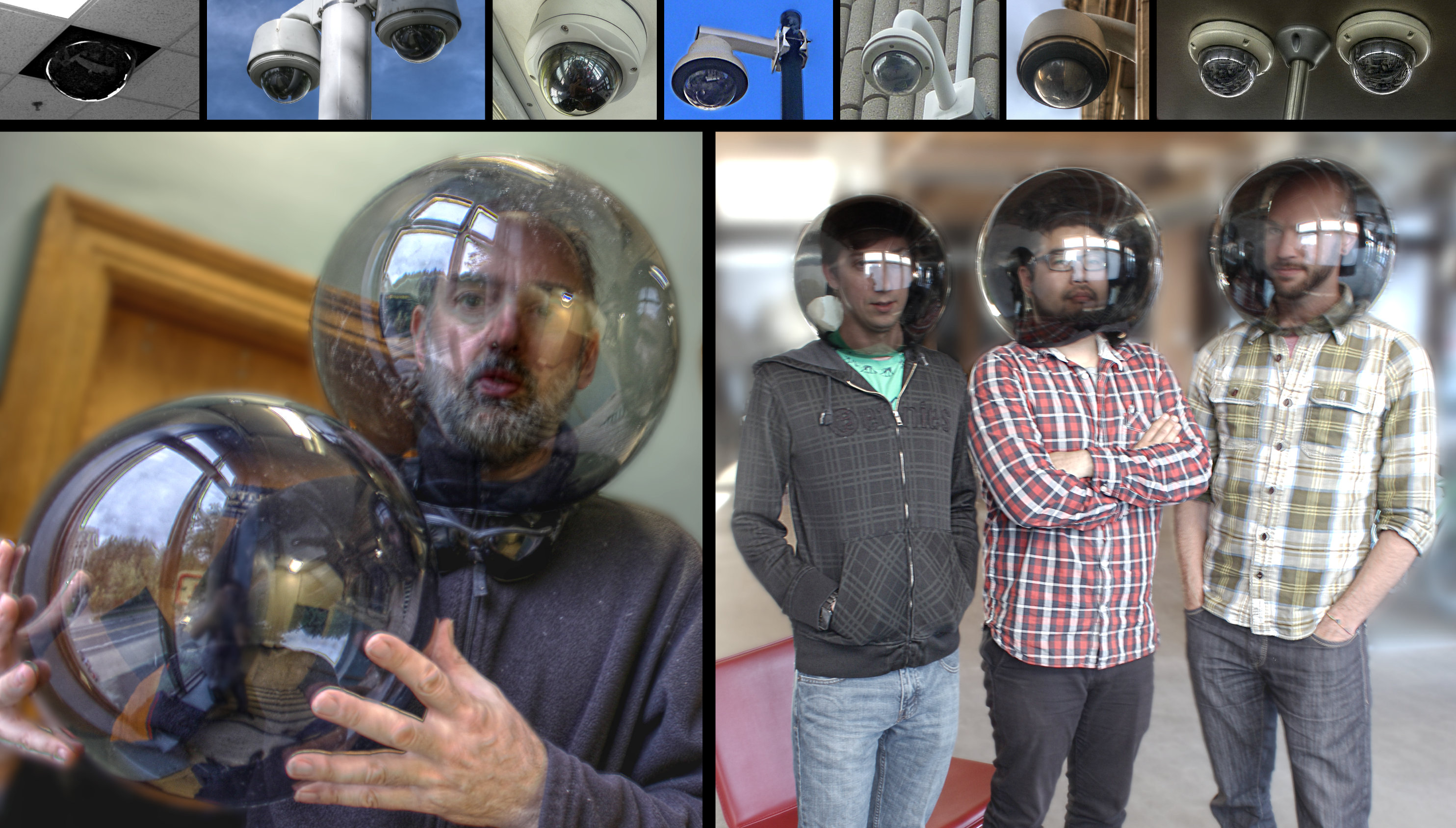
[HEADome interactive art sculptures, S. Mann, 2013].
2. People are worth more than things such as merchandise. To the extent that certain counterveilling forces, such as privacy, are required to limit the above, it should never be the case that merchandise or that which is in plain sight (e.g. retail business) is given a higher value than human life and health. If cars and buildings can "see" then so should people (e.g. with a seeing aid at least as capable as that of cars and buildings). And we must not create a world where things know everything about us and reveal nothing about themselves. We must change the IOT (Internet of Things) to the IOOT (Internet of Open Things), or the IOI (Internet of Integrity).
3. Veillance with integrity brings safety. Since wearing a computational seeing or memory aid can result in physical assault, there needs to be a way for the seeing aid to capture evidence of the assault, especially when the assault is perpetrted by owners of surveillance cameras where there is an inherent conflict-of-interest (e.g. in an establishment where surveillance is used but might be deleted by the perpetrators).
4. Veillance with integrity helps establish facts. Rapidly expanding one-sided surveillance leaves us vulnerable to false accusations, suspicion, etc., from surveillance taken out-of-context. We need to have the right and ability to exonerate ourselves from false accusations or suspicion. For example, if we're going to be held responsible for our actions, we should be able to create an alibi, e.g. through systems such as AlibEye(TM); see pages 52 and 53 [PDF pages 5 and 6]. The AlibEye System is just one of the many projects the Veillance Insitute will undertake to help build a world of integrity. People need to be able to defend themseveles and argue their own case, with their own data, not just random data from other parties, or people lose mastery over their own lives. As we age, our memory fails us. And what if we were to suffer a head injury, for example -- a "black box" life recorder might help us solve the mystery of its cause and identify a perpetrator. So imagine being called to the witness stand in a court of law, and being asked "Where were you on the night of 2015 July 16th?" to which you might have to answer "Your honour, I was forbidden from remembering.", or "My memories were deleted.". See "Veillance Contract" above. The Veillance Institute will undertake to create such life recorder systems (capture of physiological signals plus surrounding contextual information such as video) for improved health care and safety. Integrity of body (health), through veillance, will bring about a pivotal transformation in personal health and safety.
5. Mapping Veillance Integrity: The Integrometer. There are many "grey areas" in the world of private property, for example. A shopkeeper can legally install cameras in his store and legally forbid you from recording. We aim to create an hypocrisy/integrity map that lists establishments by way of their willingness to accomodate people's need to see and remember what they have seen. We propose a ranking system like the "star system" for rating hotels and movies (maybe one to five integral signs to rank integrity).
6. You have a right to record while being detained on private property. Imagine if you were unlawfully detained and physically assaulted by department store employees, and due to a head injury, had trouble remembering what happened. Moreover, imagine that your video was deleted due to the shopkeepers, further making it difficult for you to make your case in court.
Let us begin with a specific situation where the case can be clearly made in favour of recording.
Presently recording on private property, such as retail establishments, is enforced through the Trespass to Property Act. If they see you disobeying their "no photos" or "no cameras" rule, they can ask you to leave (they can't legally delete any of your recordings or assault you), and if you refuse to leave, they can call the police and charge you with trespassing.
One area we want to focus is a specific situtation where a person is detained under a false shoplifting accusation. We argue that a person cannot be trespassing while they are being detained. Since they cannot be trespassing, we argue that they cannot be prohibited from recording. It follows therefore, that a person detained on private property cannot be prohibited from recording during the time that they are being detained.
We feel this is an important "axiom" that the world should be made aware of. See for example this Canadian Tire incident.
7. We're surrounded by technologies of surveillance.
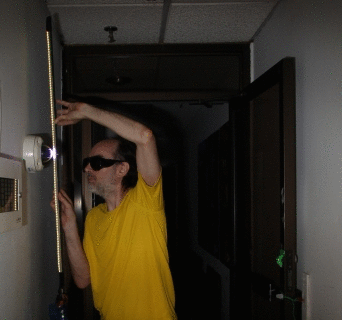
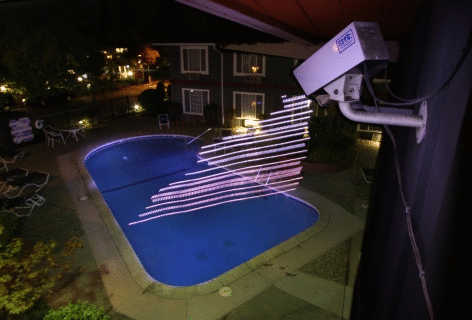
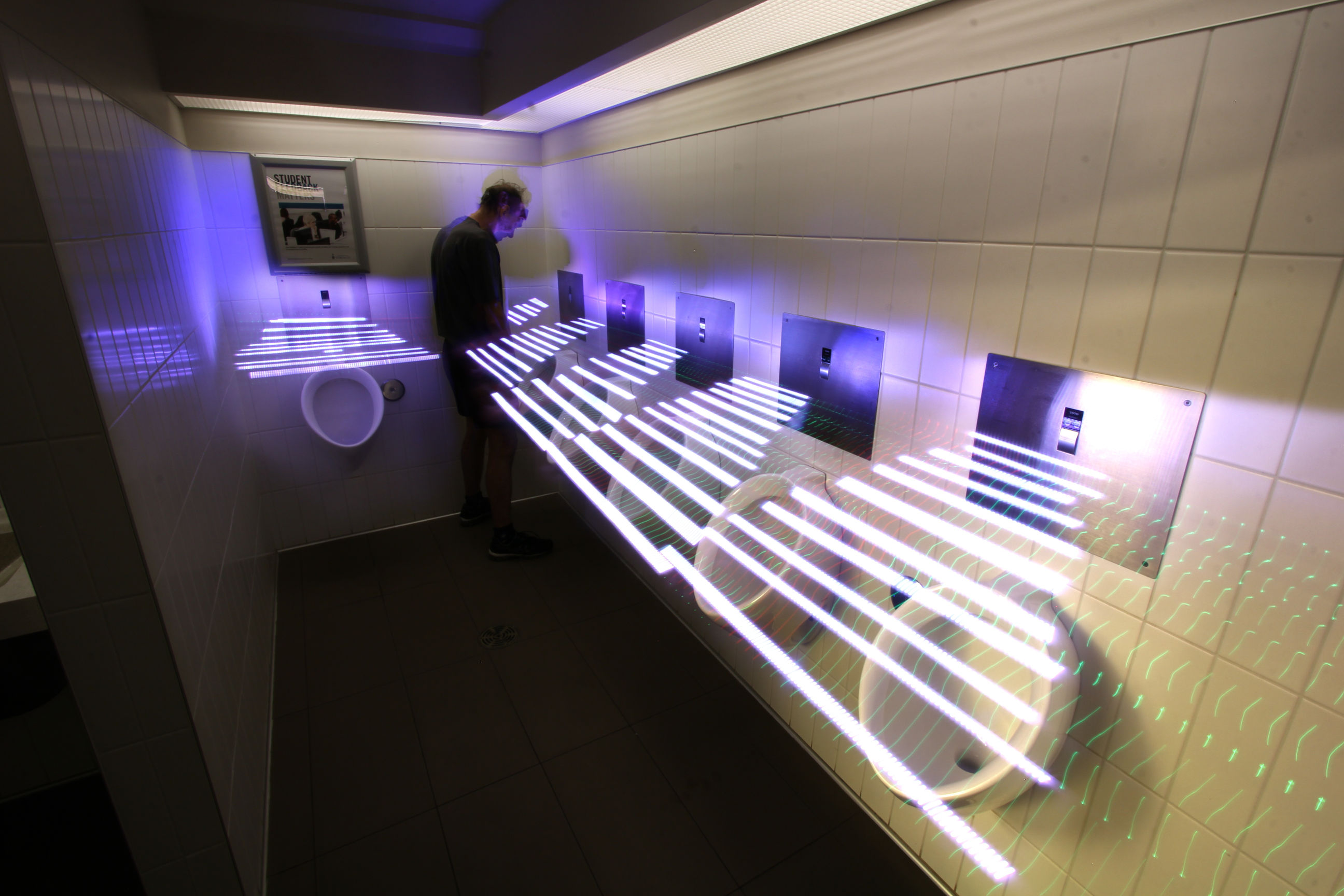
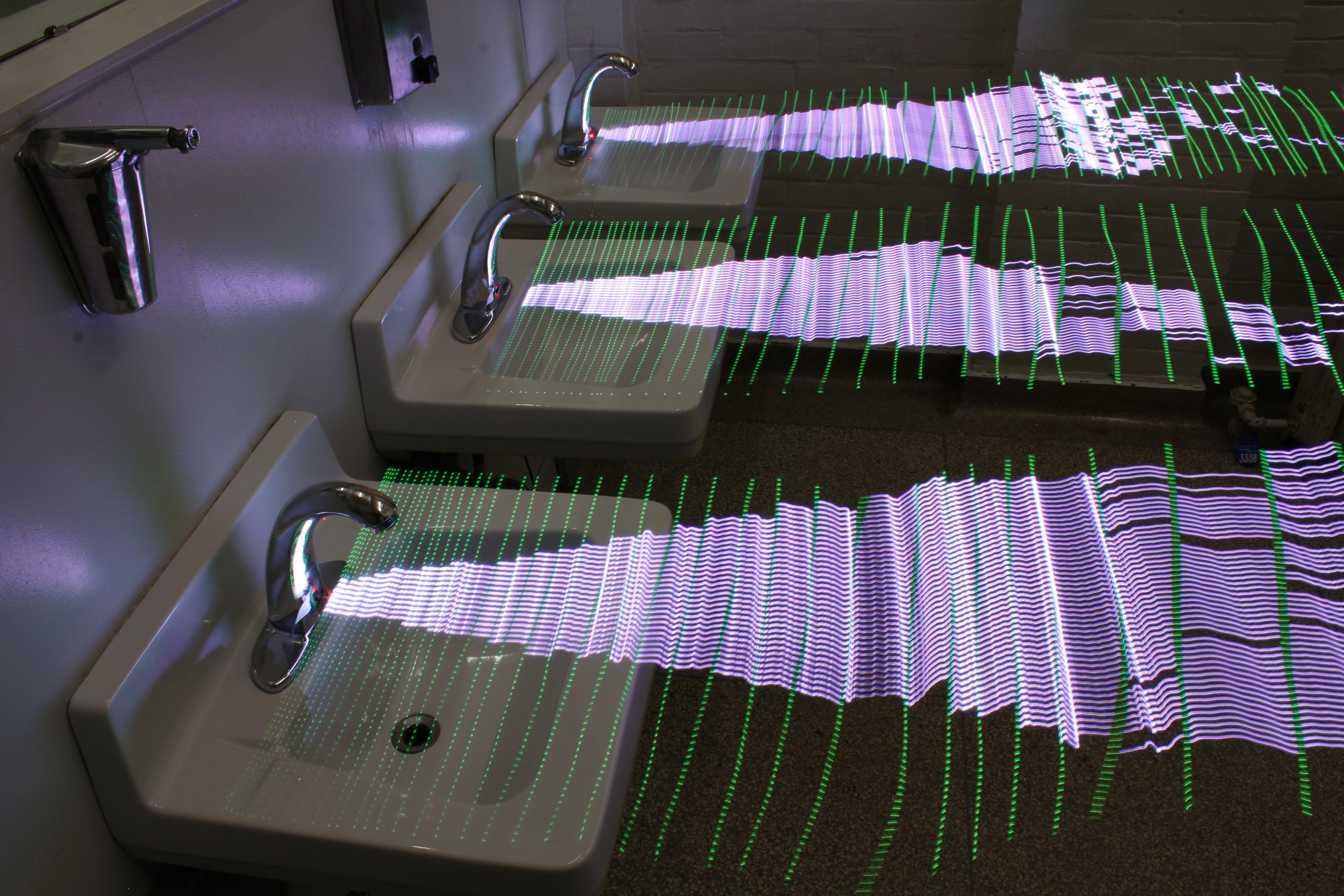
Don't Censor the Sensing of Sensors!
The cameras in toilets, urinals, and faucets, first one-pixel sensors, then 128 pixel or 1024 pixel sensors, are growing more intelligent ["CCD camera element used as actuation detector for electrical plumbing products", Canadian Pat. 2602560; see also WO 2012043663 and U.S. Pats. 6671890, 8162236]. Other fixtures like streetlights and appliances are also using built-in hidden cameras [LED outdoor lighting and embedded, invisible CCTV][Cisco Smart+Connected City Lighting]. With closed-source we don't know what's in them. So we need the right to tinker and understand how these things work. The Veillance Institute will undertake to create standards of Integrity for IoT: Things should no longer be allowed to "know" everything about us but reveal nothing about themselves.
Veillance Institute will also undertake to further develop the field of Metaveillance (veillance of veillance, i.e. watching the watching, and sensing of sensing). This reveals the otherwise hidden world of sensors, from high pixel-count surveillance cameras, to low pixel-count cameras used in washroom sensors (e.g. pixel counts as low as 128 pixels), as illustrated above.
This situation compels us to act, to create a Veillance Institute: an organization dedicated to providing the technologies, understanding, and expertise required, to bring fairness and accountability to the collection and recording of sensory data, to influence public policy, and to develop technologies and standards for integrity.
We're looking for anyone who understands and cares about these issues, and who wishes to contribute: intellectually, technically (engineering and architecting the future of Wearables and IoT), financially, or otherwise. In particular, we seek lateral thinkers who see what is at stake here. Our objective is to invent, design, and build the technologies, their etiquette, surrounding connections, community, policies and expertise in veillance, and thereby shape society and the future.
Our goal is to develop technologies and business practices around basic principles of honesty, integrity, health and safety, privacy, rembrance, and humanstic intelligence.
Key concepts:
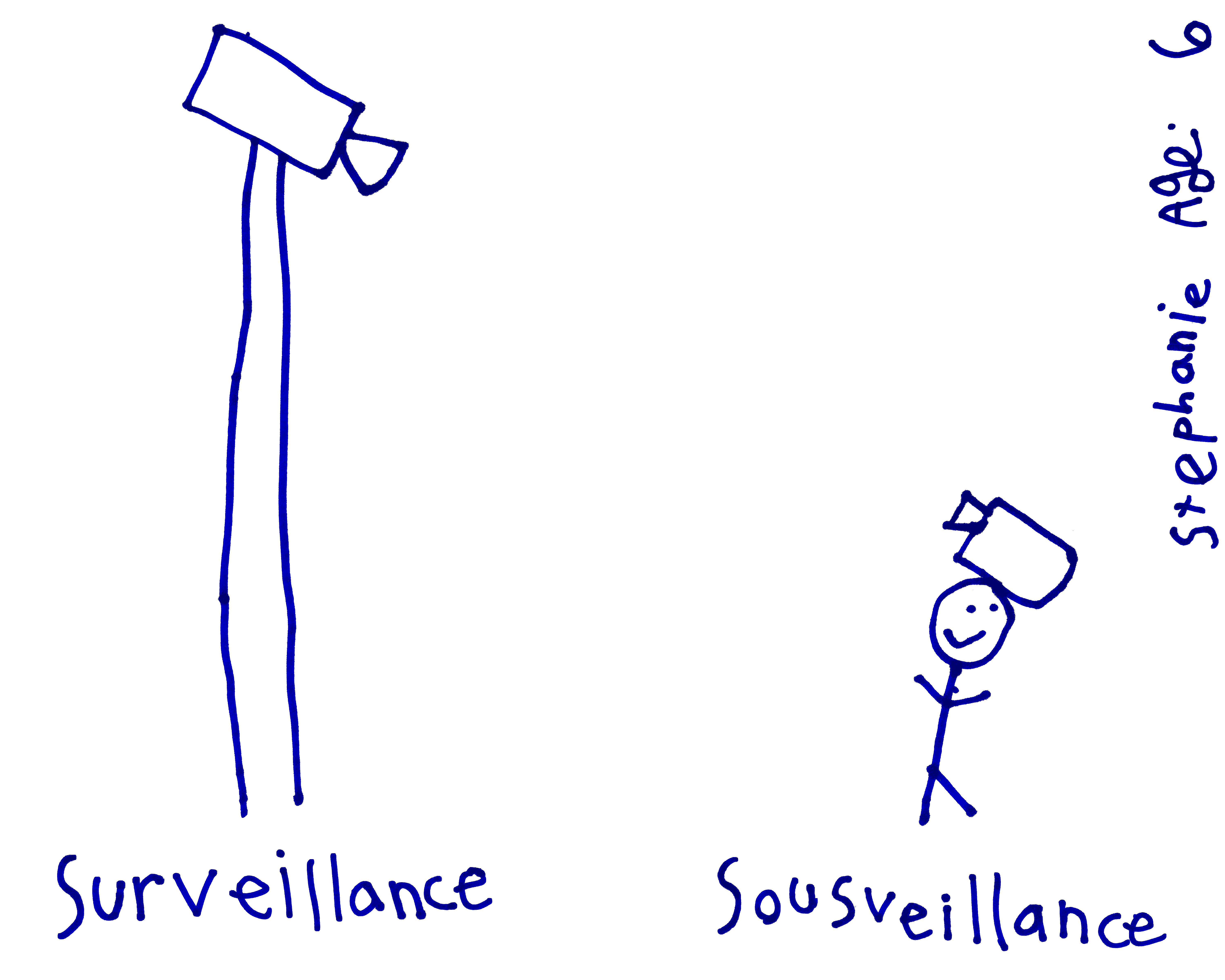
Technologies, projects, contributions, and deliverables